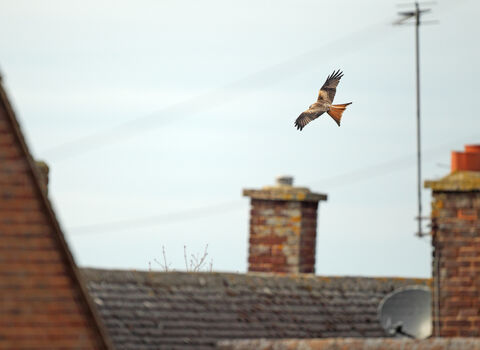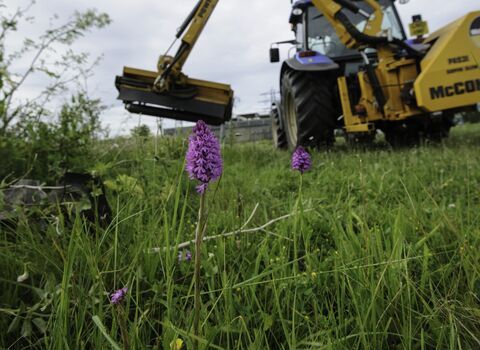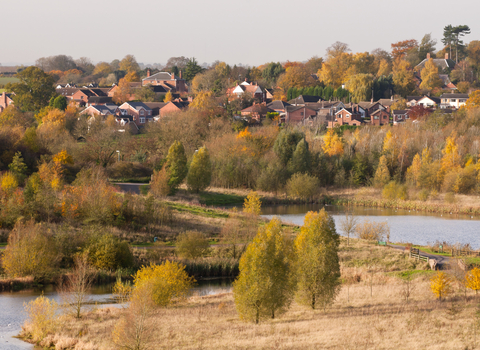UK Government pushes through damaging Planning and Infrastructure Bill
Despite valiant efforts by nature champions in the House of Lords, the Government bulldoze the wildlife-harming Planning & Infrastructure Bill through its last remaining hurdles.
On 13 November 2025, the Government whipped its supporters in the Commons to reject two reasonable and vital amendments to the Planning and Infrastructure Bill. The amendments would have stopped Environmental Delivery Plans (EDPs) from being used to greatly damage habitats and species (amendment 130) and brought in protections for chalk streams (amendment 94).
On 24 November, despite the calls of nature charities, experts, some passionate parliamentarians, and lots of concerned members of the public, the Lords did not insist on the amendments (withdrawing Amendment 130 and voting against the chalk stream amendment). Now that the Bill has been passed by the Lords, it will soon receive Royal Assent, making it law.
Thank you to the tens of thousands of you who got involved, to every MP and peer who listened and spoke up for nature. Without these collective efforts, the Bill could have been much worse, and Ministers have given verbal commitments to protecting wildlife. We won’t stop fighting for nature - we will hold Ministers to their commitments and do all we can to help wildlife as the Bill is implemented.
Ultimately, despite these hard-fought-for improvements to the Bill, this is a step back for nature. A Government elected on a stated promise to save nature has, within eighteen months, whipped its MPs and peers to allow proposals that risk environmental regression, to reject compromises that work for development and nature, and to throw out proposed protections for one of our rarest and most vulnerable habitats - chalk streams.
During this turbulent time for environmental protections, stay up to date on what happens and how you can help the fight to protect wildlife and restore nature by becoming a Wildlife Ambassador.

Red kite © Luke Massey/2020VISION
'Build Baby Build'
There is a real threat that further weakening of nature protections, including Biodiversity Net Gain, will follow very soon. The Wildlife Trusts have teamed up with the RSPB to warn that the UK Government’s blinkered “Build Baby Build” agenda is creating a perfect storm of threats to nature.
Part Three and the so called ‘Nature Restoration Fund’ explained
What does the Bill mean for developers and nature?
Part Three of the Planning and Infrastructure Bill ‘Development and Nature Recovery’ will grant new powers to Natural England to design and deliver Environmental Delivery Plans (EDPs). These plans will identify environmental features that will be negatively affected by developments in a particular area. Money from the new Nature Restoration Fund will then be used to deliver conservation measures to offset these harms. Essentially, it allows developers to pay for a licence to trash nature.
Where implemented, these EDPs will replace obligations under the Habitat Regulations that require developers to assess the impacts of projects on protected features of protected sites or species. Instead of carrying out project level assessments, developers will be able to pay to offset the harms they create without assessment. The absence of assessments and surveys means developers won’t even know what species and habitats they are destroying.

Pyramidal orchid on brownfield site being cleared for development by Terry Whittaker/2020VISION
#CASHTOTRASH
In its current form the legislation will not guarantee adequate environmental recovery, and in fact it risks undermining much of the hard-won progress for environmental protection that has been gained over the last 70 years.
It could represent the biggest attack on our environmental protections for a generation.
Planning bill would allow builders to ‘pay cash to trash’ nature, warns UK experts in letter to MPs
The UK Government needs to understand that high-quality, sustainable development doesn't need to be at the expense of struggling wildlife or climate. It’s not a one or the other decision.
Even with the recent amendments, the Government's Planning & Infrastructure Bill undermines the mitigation hierarchy, which is crucial to ensure that nature is properly considered throughout the planning process.
So, what is the mitigation hierarchy? Watch below to find out.
You can read more about the Government's amendments and continuing flaws in the bill here:
The Planning and Infrastructure Bill: review of the amendments - Estelle Bailey MBE, Chief Executive of BBOWT
Why the amendments to the bill are not enough - Estelle Bailey MBE
A house divided cannot stand - Estelle Bailey MBE
Reforms must protect nature - Matthew Stanton, Director of External Affairs
The Nature Restoration Fund - Joe Humpage, Policy Assistant
Planning by numbers - Becky Pullinger, RSWT Head of Land Use Planning
Podcasts
If you are interested in helping wildlife by lobbying your MP and/or local councillors, how about joining our growing community of more than 1,000 Wildlife Ambassadors? We will contact you with suggested actions, including advice about what you can include in your communications.

